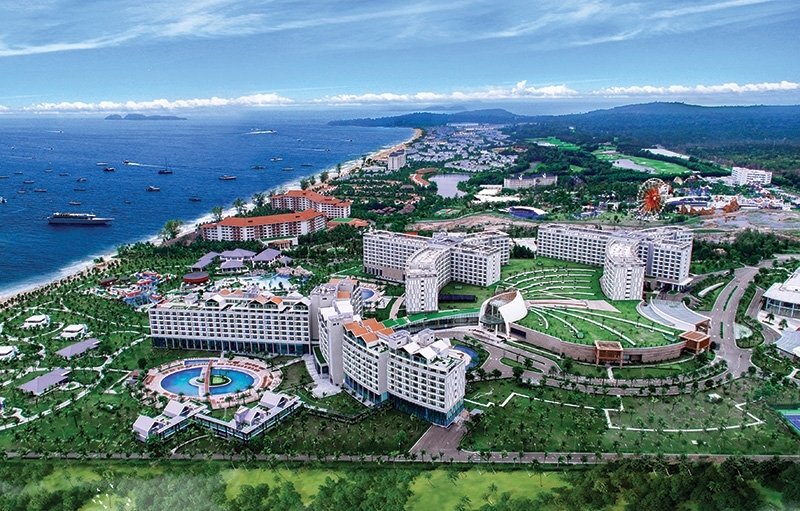
Only experienced and thorough investors will be able to avoid confusion in the current condotel-buying arena. (Photo: Le Toan)
To be more specific, a more international understanding is that the owner of a condotel can either operate it by themselves or leave it under the management of the developer (or any other property management company) and receive profit. In the former option, the owner may use their condotel as their own tourist accommodation or rent it out as any hotel room. In the latter situation, the authorised manager will lease it as a hotel room, generate profit from the rental, and receive a management fee.

By Kevin Hawkins - Co-executive partner, ZICO Law Vietnam.
The initial driving forces behind the condotel form were developers who lacked financial funding during the construction stage of the project. These developers would pre-sell units in the project, and then use the money from buyers to complete the project construction. These developers in turn promised buyers a substantial profit for leasing the units as hotel rooms in order to make it an attractive investment.
However, the legal system in Vietnam has not provided a definition of condotel or set forth any provision to regulate this type of hybrid real estate investment. While there are various permutations of the concept, it generally boils down to two competing concepts.
The first is that the condotel is a residential unit being constructed by a developer on residential land with the right to sell such units as residential units, and which units are then offered for the buyer to participate in a rental pool which is operated as a hotel. This is the first scenario, which matches the international understanding.
The second scenario is that the condotel units are constructed in connection with the construction of a licensed hotel or resort project on commercial land, and such units are sold to buyers for residential purposes and for participation in hotel operation.
The problem with the first scenario is that the function of condotels is both residential and commercial, but the function of the project building must be in accordance with the land-use purpose. Even though buyers are entitled to a red book, the certificate of land-use rights, ownership of residential house, and other assets attached to land, operation of the condotel as a hotel while it is built on residential land is prohibited.
The issue with the second scenario is that the construction of residential housing in general, whether it is separate house or condominium, or on non-residential land such as commercial land, is prohibited under the Law on Residential Housing.
Therefore, a buyer of a condotel unit in the second scenario will not be granted with a red book. Furthermore, according to Article 126.3 of the Land Law, the duration of lease of commercial land to implement investment projects in Vietnam must not exceed 50 years for usual projects and 70 years for projects with significant investment capital.
Therefore, a buyer of a unit in the second scenario is not entitled to obtain land use rights for the condotel on a stable and long-term basis. This has a chilling effect for investors and buyers resulting in a downward track for such purchases in Vietnam.
Since there is no definition for this new type of real estate under Vietnamese laws, potential buyers are likely to be confused. Buyers who are unfamiliar with the distinction may mistake a condotel for a condominium, which can be used for permanent residence because the pre-sale of condotels resembles the sale of a residential house to be formed in the future. Another potential harm for buyers, as mentioned above, stems from the developers of condotel projects offering buyers high profits for the rental pool programme.
Nonetheless, some experts are doubtful of developers’ profit claims on the grounds that tourism is a seasonal industry with fluctuations in revenue and, more significantly, the lack of any regulation requiring developers to set aside such payments to buyers in some form of escrow account or otherwise provide a guarantee for such payment.
Developers often hold the view that land used for construction of a condotel project should be considered as “residential land with no residential unit formed”, and owners of such units should be granted with a long-term red book to acknowledge their ownership of the unit. Developers argue that such an interpretation is necessary in order for the condotel real estate sector to develop.
Having the contrary view are those with the opinion that a condotel should not be considered as property for residential purpose because it will impact on related concerns such as land use and urban planning. In some jurisdictions, such as the south-central province of Binh Dinh, its Department of Natural Resources and Environment granted long-term red books to several condotel projects built on residential land with the explanation that the concept is still associated with a residential purpose.
There are even differences within governmental agencies regarding a solution for this dilemma. The Ministry of Construction (MoC) favours the idea of keeping only residential real estate for sale, and that condotels must be treated as investments and their owners are not entitled to land-use rights. Another solution, which is not endorsed by the MoC, is to give developers of the resort properties the right to sell them as residential units.
Although there is no agreement on the correct approach, local authorities, developers, and legal experts at least concur that a proper legal framework for condotels is required in order to resolve the controversy.
As it currently stands, the development and operation of condotels attempt to find legal basis in no less than four relevant laws, including the Law on Real Estate Business, the Law on Housing, the Land Law and the Law on Construction, but none of these laws provide the clear framework that is needed.
Complicating the legal situation are the various authorities that also claim some level of oversight for condotels, such as the Ministry of Natural Resources and Environment (MoNRE), the Ministry of Culture, Sports, and Tourism (MoCST), and the MoC. Noting the concerns raised by this issue, the prime minister has issued Directive No.11/CT-TTg dated April 23 on certain solutions for fostering stable and sound development of the real estate market. In the directive, the prime minister assigned the MoC to “issue amendments to regulations and standards for construction of various types of apartments, condotels, resort villas, and officetels.”
The directive further assigned the MoNRE the obligation to “issue documents providing guidance on land-use” and “conduct a study on amendments to land-use regime, and issue certificates of land-use rights and ownership of other property on land” applied to certain new types of real estate such as condotels, resort villas, and officetels.
In the meantime, the directive assigned the MoCST to “enact regulations on management and sale of condotels and resort villas”. All of the aforementioned assignments are to be completed within the third quarter of 2019, which means drafts of regulations are expected to be published sometime before the end of this year.


















